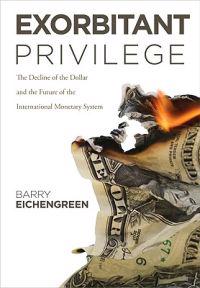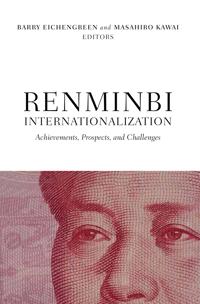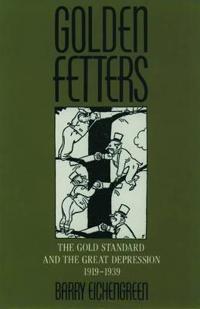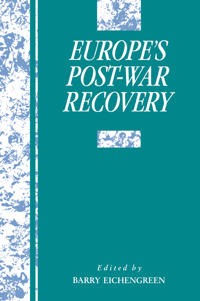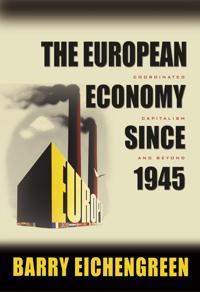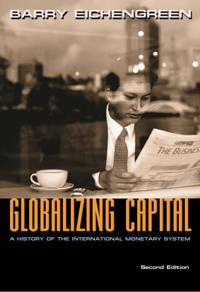Hall of Mirrors (Inbunden)
avBarry Eichengreen
ISBN: 9780199392001 - UTGIVEN: 2015-01The Great Depression and the Great Recession are the two great economic crises of the past hundred years. While there are accounts of both episodes, no one has yet attempted a sustained comparative analysis. In Hall of Mirrors, Barry Eichengreen draws on his unparalleled expertise for a brilliantly [...]
Exorbitant Privilege (Inbunden)
avBarry Eichengreen
ISBN: 9780199596713 - UTGIVEN: 2011-02-19Since the Second World War, the US dollar has been the world's sole international reserve currency, giving it, in the words of one critic, 'exorbitant privelege'. But in the wake of the worldwide financial crisis, will other currencies overtake it? And what impact would that have? Eichengreen explai[...]
Exorbitant Privilege (Pocket)
avBarry Eichengreen
ISBN: 9780199642472 - UTGIVEN: 2012-09-27The story of how the dollar rose to global dominance in the twentieth century - and an assessment of what the future holds for the world's most important currency.[...]
Exorbitant Privilege: The Rise and Fall of the Dollar and the Future of the International Monetary System (Inbunden)
avBarry Eichengreen
ISBN: 9780199753789 - UTGIVEN: 2011-01For more than half a century, the U.S. dollar has been not just America's currency but the world's. It is used globally by importers, exporters, investors, governments and central banks alike. Nearly three-quarters of all $100 bills circulate outside the United States. The dollar holdings of the Chi[...]
Global Imbalances And The Lessons Of Bretton Woods (Pocket)
avBarry Eichengreen
ISBN: 9780262514149 - UTGIVEN: 2010-02-05Why the current Bretton Woods-like international financial system, featuring large current account deficits in the center country, the United States, and massive reserve accumulation by the periphery, is not sustainable.[...]
From Miracle to Maturity (Inbunden)
avBarry Eichengreen, Dwight H. Perkins, Kwanho Shin
ISBN: 9780674066755 - UTGIVEN: 2012-11The economic growth of South Korea has been a remarkable success story. After the Korean War, the country was one of the poorest economies on the planet; by the twenty-first century, it had become a middle-income country, a member of the Organization of Economic Cooperation and Development (the club[...]
Renminbi Internationalization (Pocket)
avBarry (EDT) Eichengreen, Masahiro (EDT) Kawai, Barry (EDT) Eichengreen
ISBN: 9780815726111 - UTGIVEN: 2015-02China's major monetary policy goal is the internationalization of the renmimbi, i.e. create an international role for its currency akin to the international role currently played by the U.S. dollar. Renminbi internationalization is a hot topic, for good reason. It is, essentially, a window onto the [...]
Golden Fetters (Häftad)
avBarry J. Eichengreen
ISBN: 9780195101133 - UTGIVEN: 199607This is a reassessment of the international monetary crises of the post-World War I period, that led to the Great Depression of the 1930s. It also analyzes the responses of the world's economic powers to the Depression and how new monetary policies set the stage for the watershed post-World War II s[...]
Financial Crises and What to Do About Them (Pocket)
avBarry J. Eichengreen
ISBN: 9780199257447 - UTGIVEN: 2002-08-08European Monetary Unification: Theory, Practice and Analysis (Inbunden)
avBarry J. Eichengreen
ISBN: 9780262050548 - UTGIVEN: 1998-01-16Global Imbalances and the Lessons of Bretton Woods (Inbunden)
avBarry J. Eichengreen
ISBN: 9780262050845 - UTGIVEN: 2006-10-24Europe's Postwar Recovery (Pocket)
avBarry J. (EDT) Eichengreen
ISBN: 9780521030786 - UTGIVEN: 2007-01Western Europe's recovery from World War II was nothing short of miraculous. From the chaos of the war and the crisis of 1947, Europe moved directly to the most rapid quarter-century of economic growth in her history. The contributors to this volume seek to identify the sources of this singularly su[...]
The European Economy Since 1945 (Häftad)
avBarry J. Eichengreen
ISBN: 9780691138480 - UTGIVEN: 200807In 1945, many Europeans still heated with coal, cooled their food with ice, and lacked indoor plumbing. Today, things could hardly be more different. Over the second half of the twentieth century, the average European's buying power tripled, while working hours fell by a third. "The European Economy[...]
Globalizing Capital (Häftad)
avBarry J. Eichengreen
ISBN: 9780691139371 - UTGIVEN: 200809First published more than a decade ago, "Globalizing Capital" remains an indispensable part of the economic literature today. Written by renowned economist Barry Eichengreen, this classic book emphasizes the importance of the international monetary system for understanding the international economy.[...]




